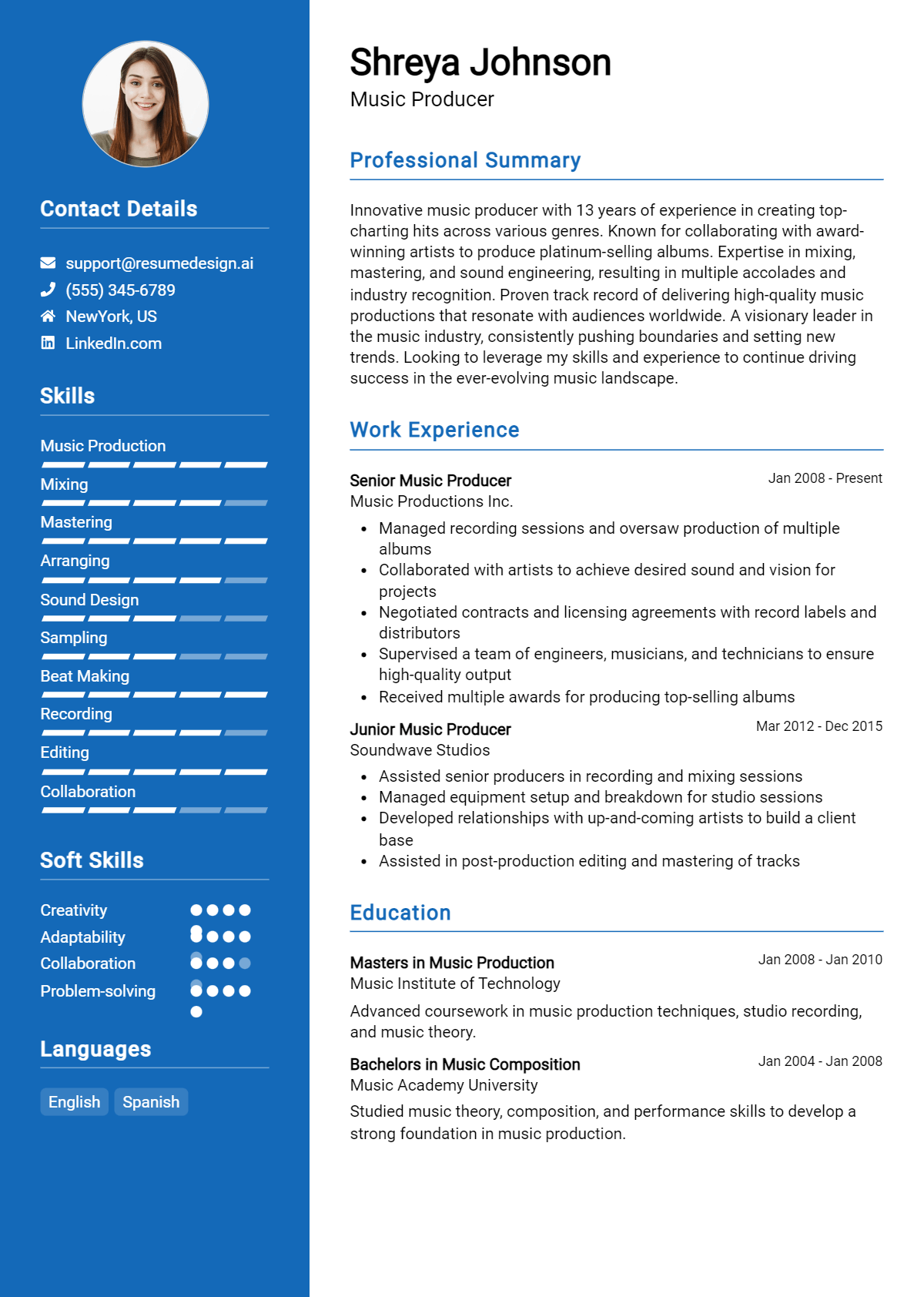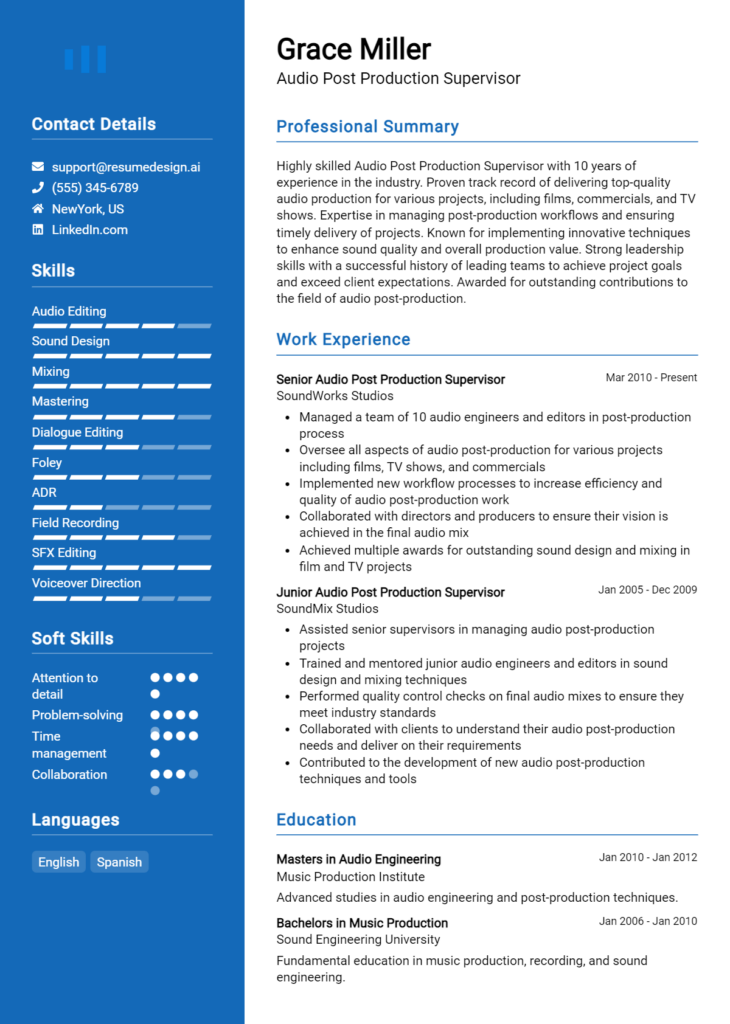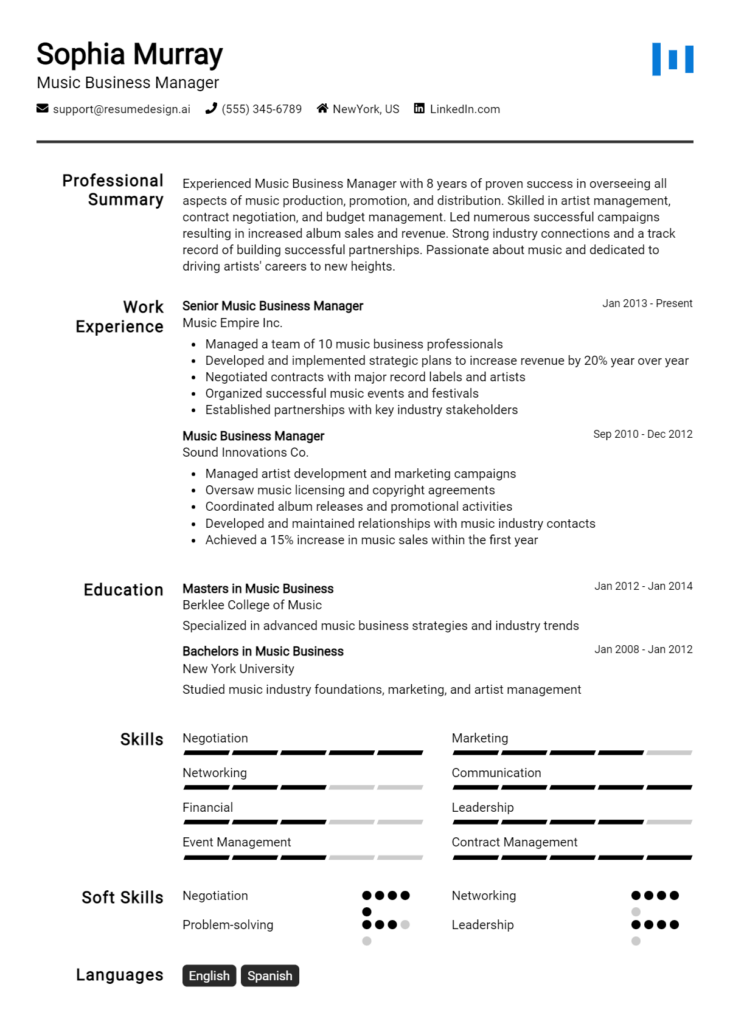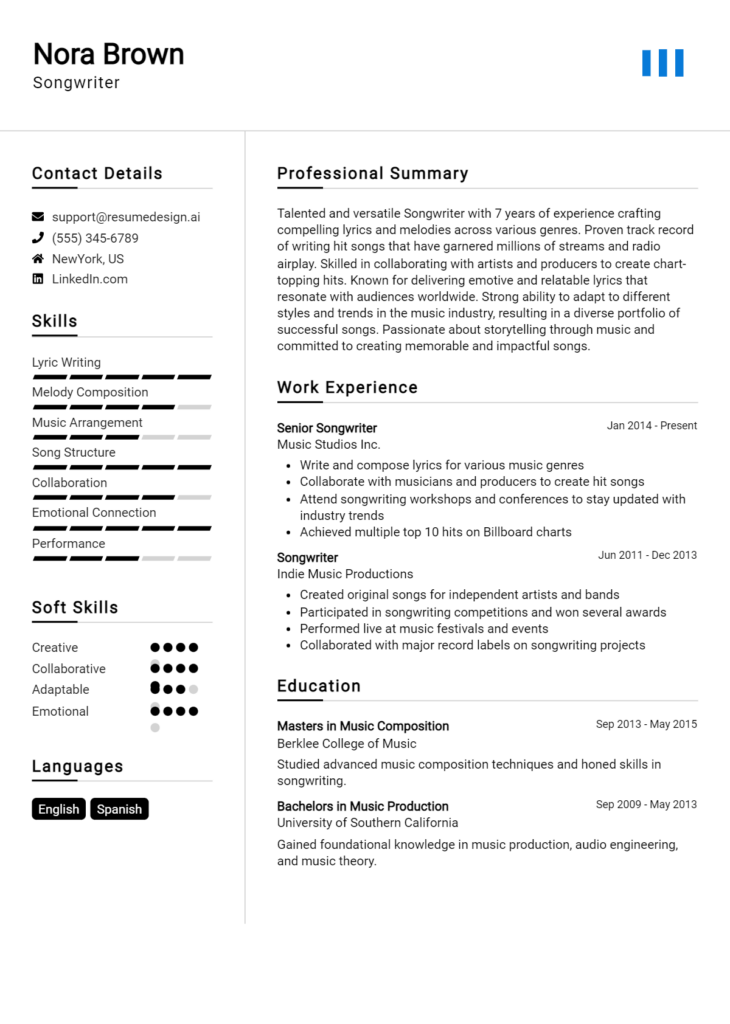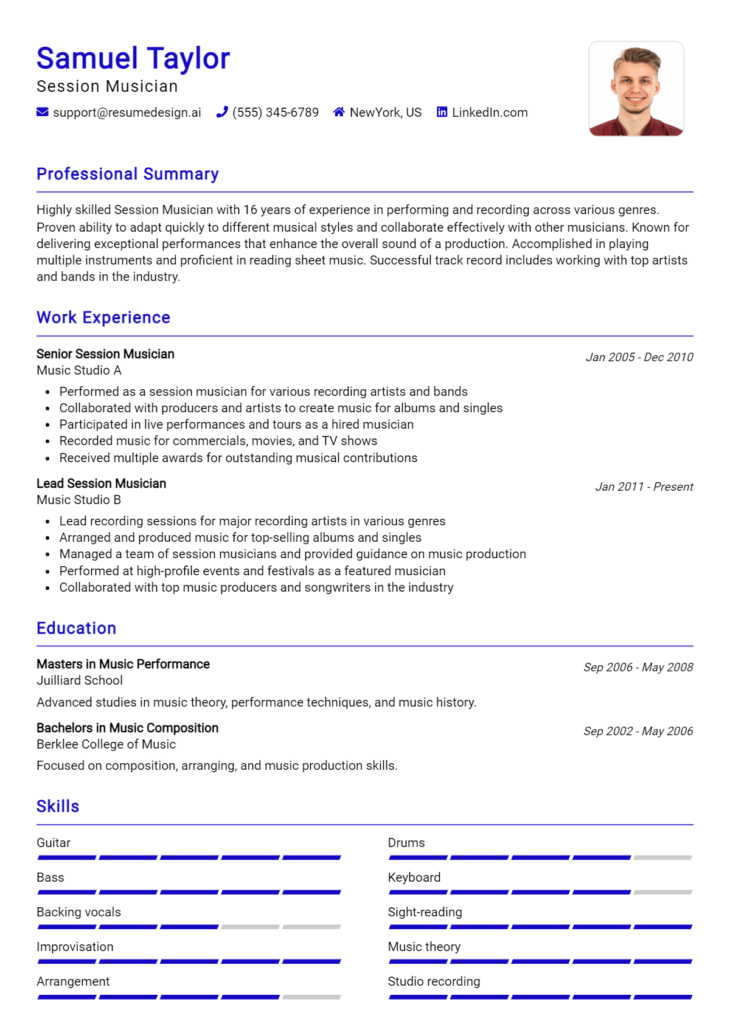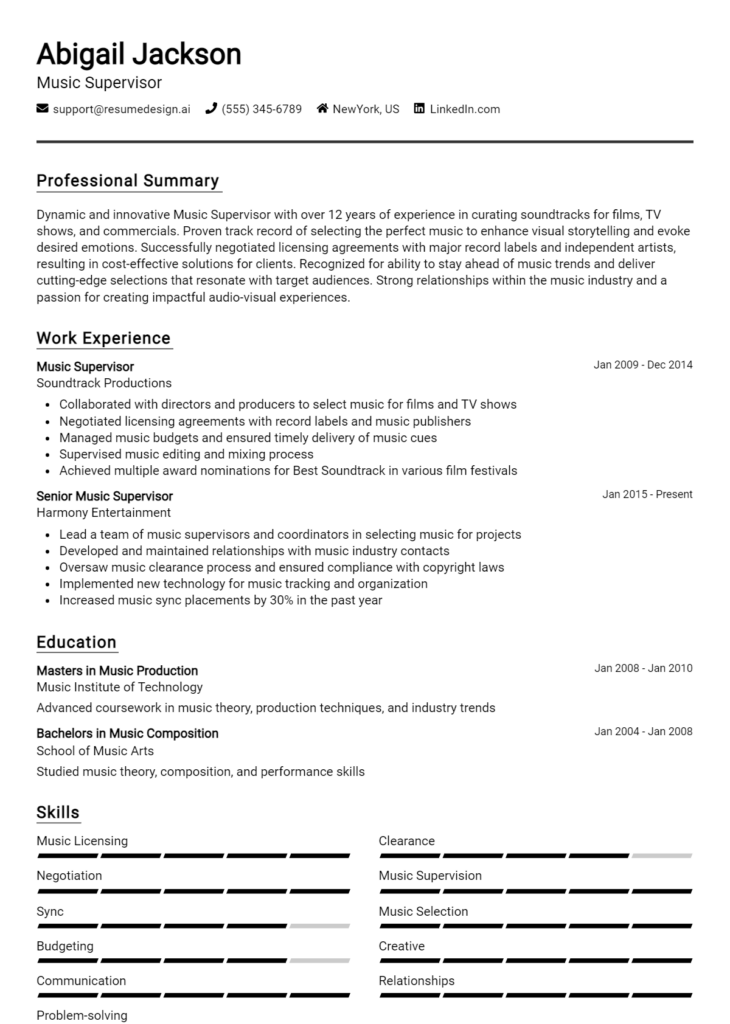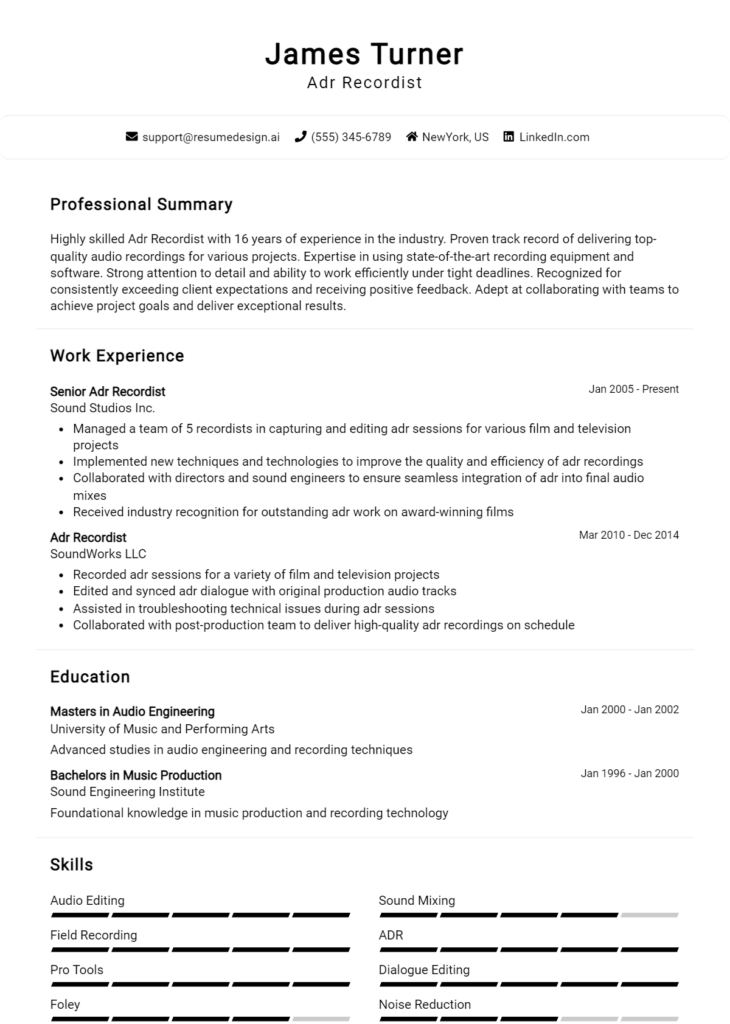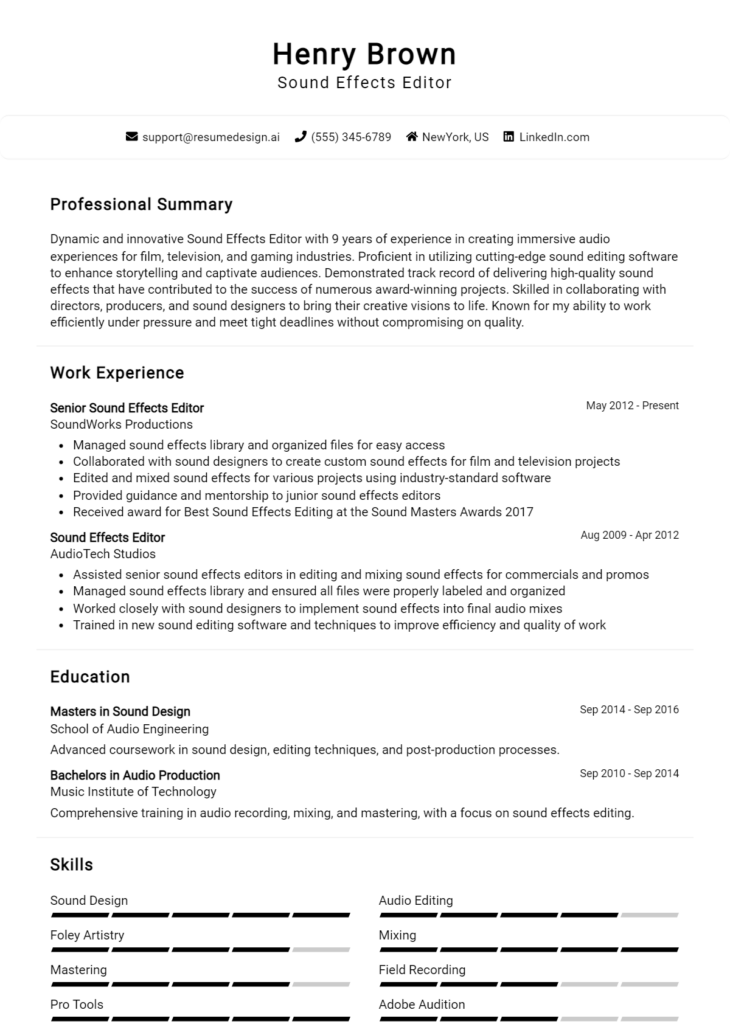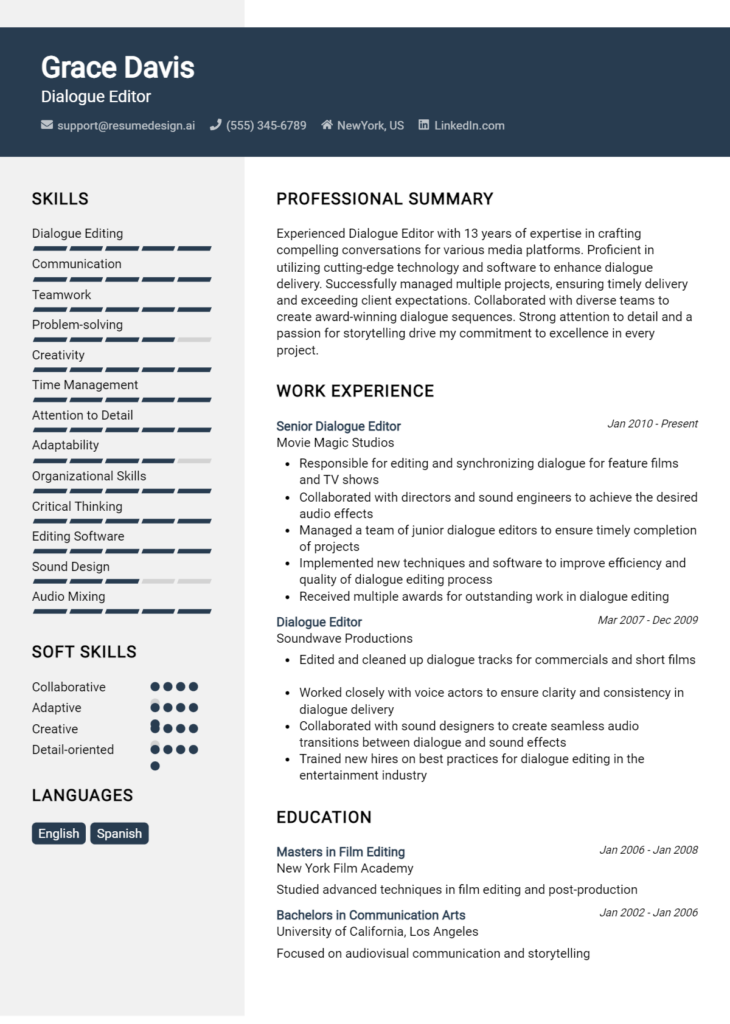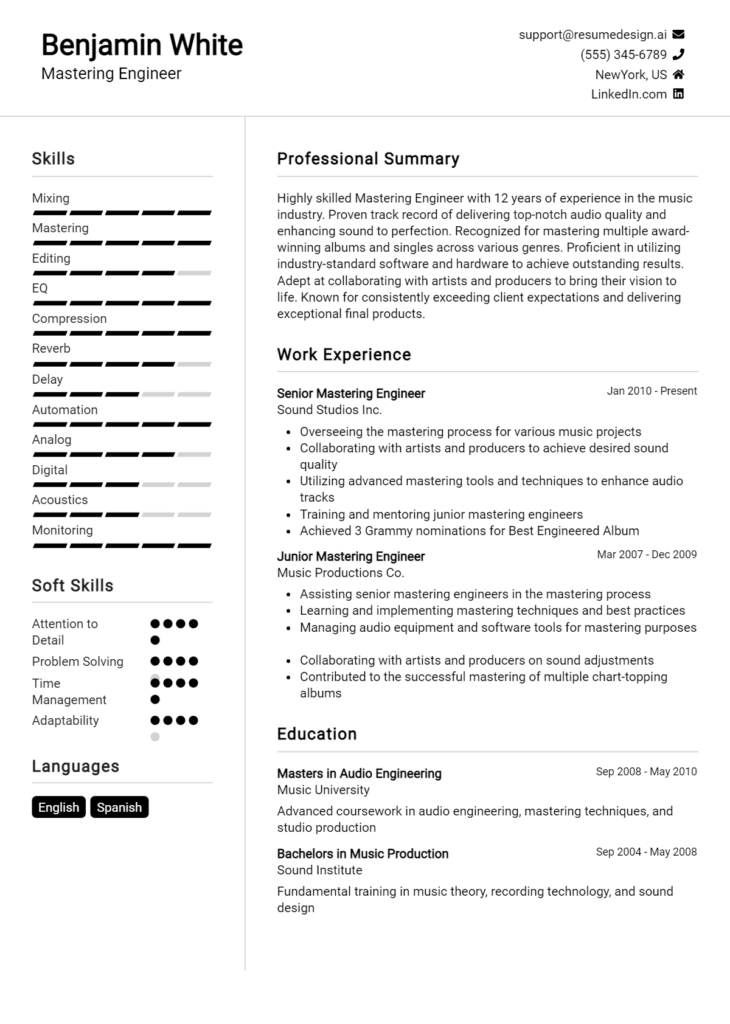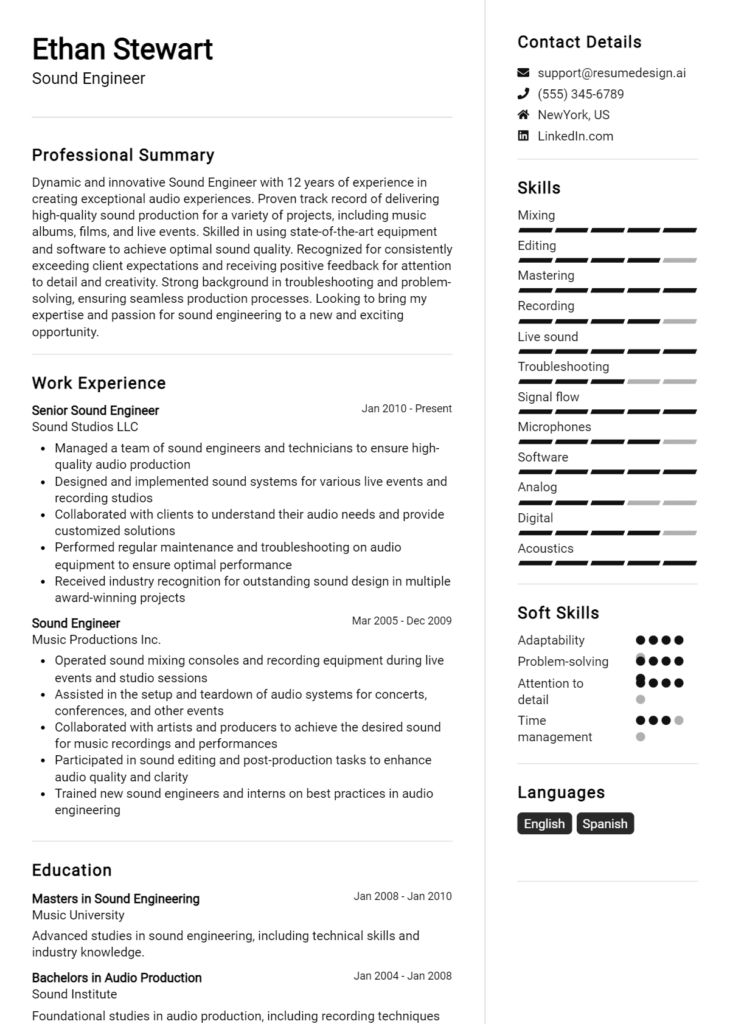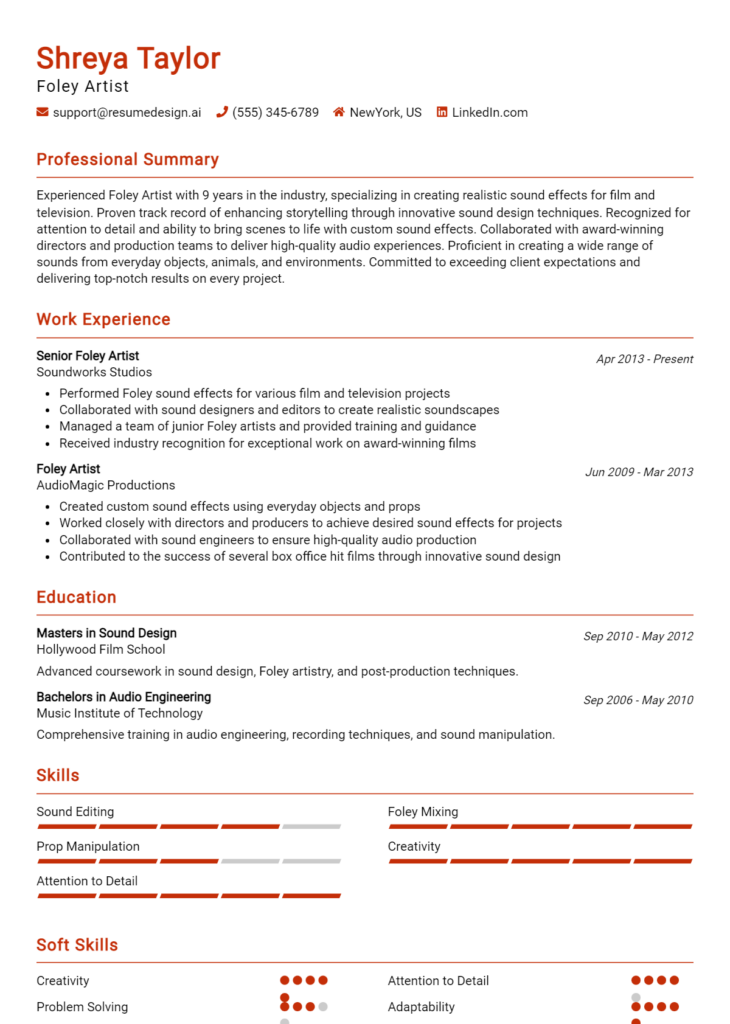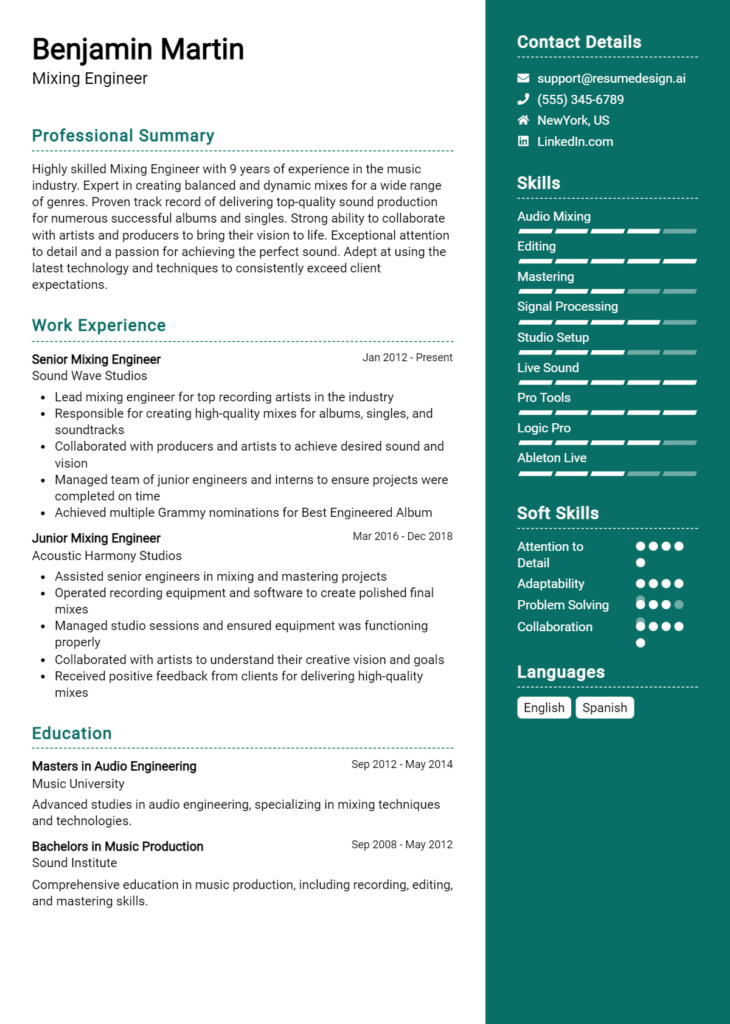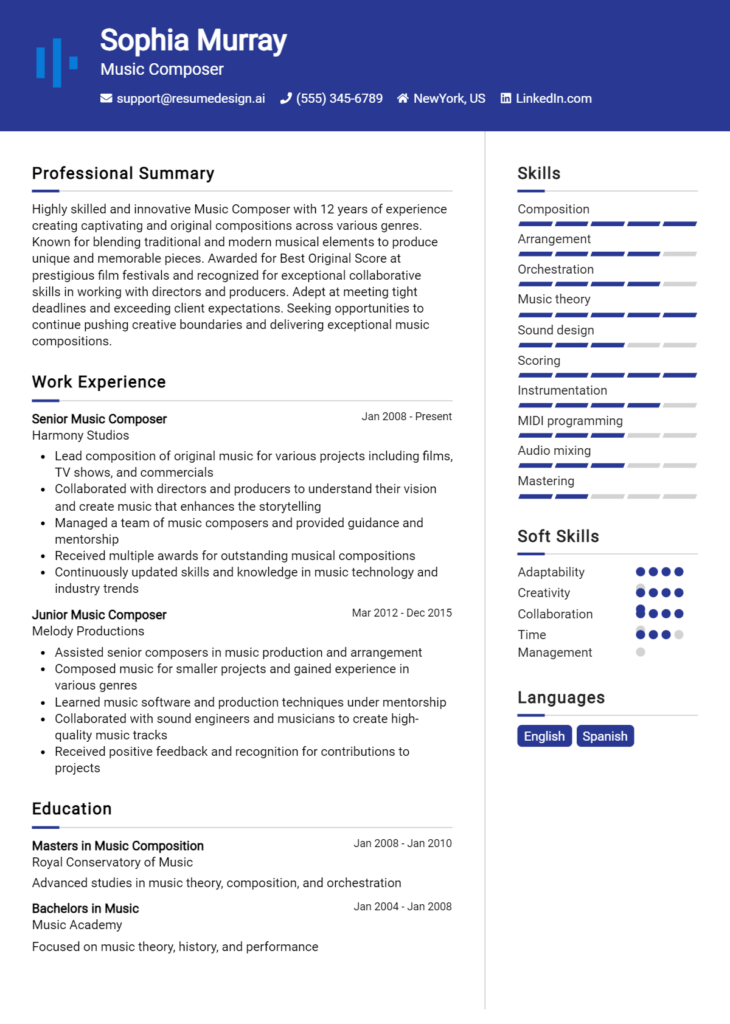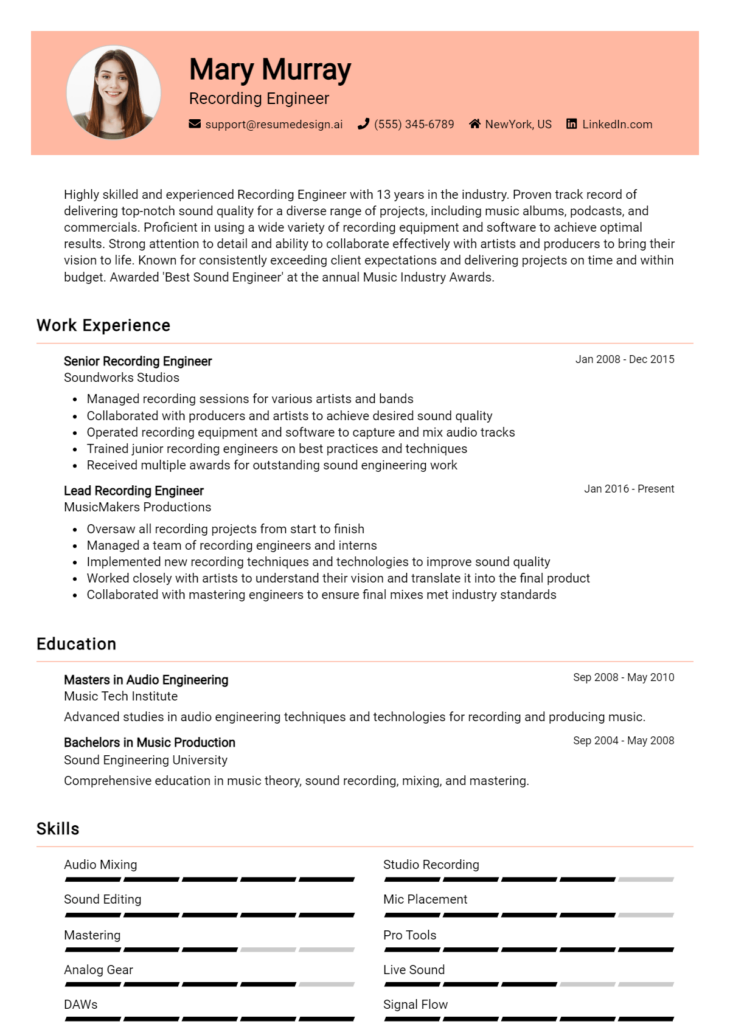Music Producer Core Responsibilities
A Music Producer plays a pivotal role in the creation of music by overseeing the entire production process, from pre-production planning to final mixing. Key responsibilities include collaborating with artists, arranging musical elements, and managing recording sessions. This role requires strong technical skills in audio engineering, keen operational awareness, and adept problem-solving capabilities to navigate challenges. By bridging creative and technical departments, a Music Producer ensures that the final product aligns with the organization's goals. A well-structured resume can effectively showcase these qualifications, highlighting relevant experiences and skills to attract potential employers.
Common Responsibilities Listed on Music Producer Resume
- Collaborating with artists and songwriters to develop musical concepts
- Arranging and composing music to enhance the artistic vision
- Managing recording sessions and coordinating studio logistics
- Editing and mixing audio tracks to achieve high-quality sound
- Overseeing the budget and scheduling for music projects
- Maintaining communication with various departments, including marketing and distribution
- Conducting sound checks and troubleshooting technical issues
- Staying updated on industry trends and emerging technologies
- Providing creative feedback and guidance to artists
- Ensuring compliance with copyright and licensing regulations
- Building and maintaining relationships with industry professionals
- Utilizing software and DAWs for music production and editing
High-Level Resume Tips for Music Producer Professionals
In the competitive world of music production, a well-crafted resume serves as your first opportunity to make a lasting impression on potential employers. Your resume is not just a list of your past jobs; it's a powerful marketing tool that reflects your unique skills, accomplishments, and artistic vision. As a Music Producer, your resume should effectively showcase your creativity and technical expertise while highlighting the milestones you've achieved in your career. This guide will provide practical and actionable resume tips specifically tailored for Music Producer professionals, helping you stand out in a crowded industry.
Top Resume Tips for Music Producer Professionals
- Tailor your resume to each job application by aligning your experience with the specific requirements outlined in the job description.
- Highlight your relevant experience in music production, including specific genres, styles, and notable projects you’ve worked on.
- Quantify your achievements wherever possible, such as the number of tracks produced, sales figures, or any awards received.
- Showcase your technical skills, including proficiency in industry-standard software and hardware, such as Pro Tools, Ableton Live, or Logic Pro.
- Include collaboration experiences with other artists, engineers, and musicians, emphasizing your ability to work in diverse creative environments.
- Feature any educational background or certifications related to music production, audio engineering, or sound design.
- Incorporate keywords relevant to the music industry to improve your resume’s visibility during applicant tracking system scans.
- Utilize a clean, visually appealing format that reflects your artistic style but remains professional and easy to read.
- List any additional skills that may set you apart, such as knowledge of music theory, songwriting, or marketing expertise.
By implementing these tips, you'll significantly enhance your resume's effectiveness, increasing your chances of landing a job in the dynamic field of music production. A well-tailored resume not only showcases your qualifications but also communicates your passion for music, making you a compelling candidate for potential employers.
Why Resume Headlines & Titles are Important for Music Producer
In the competitive field of music production, a resume headline or title serves as a critical first impression for candidates. A strong headline can immediately capture the attention of hiring managers, summarizing a candidate's key qualifications in a single impactful phrase. This concise statement should be relevant and directly related to the specific job being applied for, helping to set the tone for the resume and highlight the candidate's unique strengths and experiences. A well-crafted headline not only differentiates a candidate from others but also provides a clear indication of their professional identity within the music industry.
Best Practices for Crafting Resume Headlines for Music Producer
- Keep it concise: Aim for one impactful phrase that conveys your value.
- Be role-specific: Tailor the headline to align with the job description.
- Highlight key skills: Include essential skills or experiences relevant to music production.
- Use strong action words: Choose dynamic verbs that convey your expertise.
- Showcase achievements: Mention notable projects or awards to enhance credibility.
- Remain professional: Avoid casual language or unnecessary jargon.
- Incorporate industry terminology: Use relevant terms that resonate with hiring managers.
- Make it memorable: Create a unique phrase that stands out in a crowded field.
Example Resume Headlines for Music Producer
Strong Resume Headlines
Innovative Music Producer with 10+ Years of Experience in Genre-Crossing Collaborations
Award-Winning Music Producer Specializing in Electronic and Hip-Hop Production
Creative Audio Engineer and Music Producer with Expertise in Sound Design and Mixing
Weak Resume Headlines
Music Producer Looking for Opportunities
Experienced in Music Production
The strong headlines are effective because they immediately convey the candidate's expertise, experience, and accomplishments in a clear and specific manner. They use targeted language that aligns with the expectations of hiring managers in the music industry. In contrast, the weak headlines lack specificity and fail to highlight any unique value or qualifications, making them forgettable and less impactful. By avoiding vague language and focusing on concrete achievements, candidates can create memorable and compelling headlines that effectively showcase their strengths.
Writing an Exceptional Music Producer Resume Summary
A resume summary is a crucial component for a Music Producer as it serves as the first impression a hiring manager will have of a candidate. A well-crafted summary quickly captures attention by highlighting key skills, relevant experience, and notable accomplishments that align with the demands of the role. It should be concise and impactful, offering a snapshot of the candidate's expertise, creativity, and professional journey, all tailored to the specific job they're applying for. An exceptional resume summary can set a candidate apart in a competitive industry, making it essential to devote time and effort to create one that resonates with potential employers.
Best Practices for Writing a Music Producer Resume Summary
- Quantify Achievements: Use numbers and statistics to demonstrate your success, such as the number of tracks produced or awards won.
- Focus on Relevant Skills: Highlight key skills that are specifically relevant to the position, such as proficiency in specific software or techniques.
- Tailor Your Summary: Customize your summary for each job application to reflect the language and requirements of the job description.
- Be Concise: Aim for 3-5 sentences that effectively convey your qualifications without overwhelming the reader.
- Use Strong Action Verbs: Begin sentences with powerful verbs to convey action and impact, such as "produced," "collaborated," or "engineered."
- Showcase Industry Experience: Mention your years of experience in the music industry and any notable collaborations or projects.
- Include Unique Selling Points: Identify what sets you apart from other producers, such as a unique production style or experience in diverse genres.
- Highlight Awards and Recognitions: If applicable, mention any awards or recognitions received for your work in music production.
Example Music Producer Resume Summaries
Strong Resume Summaries
Dynamic music producer with over 10 years of experience in the industry, having collaborated with Grammy-winning artists. Successfully produced and engineered over 50 tracks that have topped the charts, including a Billboard #1 single. Proficient in Ableton Live and Pro Tools, specializing in electronic and pop music genres.
Results-driven music producer with a proven track record of increasing artist engagement by 30% through innovative sound design and marketing strategies. Over 7 years of experience in studio production, with expertise in both live recording and digital composition. Recognized for a unique ability to blend genres, leading to multiple award nominations.
Creative music producer skilled in managing end-to-end production processes and fostering collaborative relationships with artists. Produced over 100 songs across various genres, achieving an average of 1 million streams per track on major platforms. Adept in mixing and mastering, with a deep understanding of acoustics and audio engineering.
Weak Resume Summaries
Experienced music producer looking for new opportunities in the industry. I have worked with several artists and have a good understanding of music production.
Music producer with a passion for creating songs. I have some experience in the music field and am eager to learn more.
The strong resume summaries are considered effective because they include quantifiable results, specific skills, and a clear connection to the responsibilities of a Music Producer. They highlight achievements and industry experience, all tailored to the job role. In contrast, the weak summaries lack detail and specificity, making them appear generic and failing to provide a compelling case for the candidate's qualifications. They do not effectively illustrate the candidate's value or expertise within the music production field.
Work Experience Section for Music Producer Resume
The work experience section of a Music Producer resume is crucial as it provides a comprehensive overview of the candidate's practical skills and accomplishments in the industry. This section not only showcases technical expertise in sound engineering, music composition, and production techniques but also highlights the ability to manage teams effectively and deliver high-quality music products. By quantifying achievements and aligning work experience with industry standards, candidates can demonstrate their impact and value to potential employers, making this section a key element in securing opportunities in the competitive music landscape.
Best Practices for Music Producer Work Experience
- Clearly outline your technical skills related to music production software and hardware.
- Quantify achievements with specific metrics, such as sales numbers, streaming statistics, or project timelines.
- Highlight collaborative projects, detailing your role and contributions to team success.
- Emphasize leadership experiences, such as managing recording sessions or guiding junior producers.
- Include diverse genres and styles of music to showcase versatility and adaptability.
- Utilize industry-standard terminology to align your experience with what employers seek.
- Tailor your work experience to reflect the specific requirements of the job you are applying for.
- Keep descriptions concise yet impactful, focusing on key responsibilities and outcomes.
Example Work Experiences for Music Producer
Strong Experiences
- Produced a chart-topping single that achieved over 1 million streams within the first month of release, collaborating closely with artists and marketing teams to maximize reach.
- Led a team of 5 in a successful album project, resulting in a 30% increase in sales compared to the previous release, while managing studio time efficiently to meet tight deadlines.
- Implemented innovative sound design techniques that improved the overall quality of recordings, recognized by industry peers with a nomination for Best Production in the local music awards.
- Coordinated and executed a live performance event that attracted over 2,000 attendees, enhancing community engagement and promoting local talent.
Weak Experiences
- Worked on various music projects with different artists.
- Assisted in the production of an album.
- Helped with sound mixing and editing.
- Participated in numerous recording sessions.
The examples of strong experiences are considered effective because they provide concrete achievements and specific contributions that demonstrate the candidate's impact in the music industry. In contrast, the weak experiences lack detail and quantifiable outcomes, making it difficult for potential employers to gauge the candidate's true capabilities and contributions. Strong experiences are characterized by clarity, measurable success, and a clear demonstration of skills, while weak experiences tend to be vague and unimpressive.
Education and Certifications Section for Music Producer Resume
The education and certifications section of a Music Producer resume is crucial as it showcases the candidate's academic background, relevant training, and commitment to professional development. This section not only highlights formal education but also emphasizes industry-relevant certifications and continuous learning efforts that are essential for staying current in the fast-paced music industry. By providing specific coursework, certifications, and any specialized training, candidates can significantly enhance their credibility and demonstrate their alignment with the job role, making a compelling case to potential employers.
Best Practices for Music Producer Education and Certifications
- Prioritize relevant education that directly relates to music production, such as degrees in music technology, audio engineering, or sound design.
- Include industry-recognized certifications from reputable organizations to demonstrate expertise and professional standards.
- List advanced coursework or specialized training that showcases skills in advanced production techniques or software.
- Be specific about the skills gained in each educational experience, connecting them to the job requirements.
- Keep the formatting consistent and professional to enhance readability and presentation.
- Highlight any notable projects or thesis work completed during academic pursuits that relate to music production.
- Include workshops, seminars, and conferences attended to showcase ongoing education and networking in the industry.
- Regularly update this section to reflect new qualifications or relevant experiences as they arise.
Example Education and Certifications for Music Producer
Strong Examples
- Bachelor of Arts in Music Production, Berklee College of Music, 2022
- Certified Pro Tools Operator, Avid Technology, 2021
- Advanced Mixing Techniques Course, SAE Institute, 2023
- Diploma in Sound Engineering, London School of Sound, 2020
Weak Examples
- Bachelor of Science in Biology, University of California, 2018
- Certification in Microsoft Office Suite, 2020
- High School Diploma, 2016
- Online Course in Basic Photography, 2021
The strong examples are considered effective because they are directly related to music production, showcasing relevant degrees and certifications that enhance the candidate's qualifications for the role. They demonstrate a clear focus on the skills and knowledge needed in the music industry. In contrast, the weak examples are ineffective as they feature irrelevant educational qualifications and certifications that do not pertain to music production, which can diminish the candidate's perceived suitability for the position.
Top Skills & Keywords for Music Producer Resume
As a Music Producer, possessing the right skills is crucial for crafting a compelling resume that stands out to potential employers. Skills not only highlight your capabilities but also demonstrate your value in the competitive music industry. A well-rounded skill set can encompass both technical abilities and interpersonal traits, making you a versatile candidate for various projects. Whether you are collaborating with artists, managing studio sessions, or overseeing the production process, showcasing your skills effectively can significantly enhance your chances of landing the desired position. For guidance on how to effectively present your skills, visit skills and explore how to highlight your work experience.
Top Hard & Soft Skills for Music Producer
Soft Skills
- Creativity
- Communication
- Collaboration
- Problem-solving
- Time management
- Attention to detail
- Adaptability
- Leadership
- Negotiation
- Emotional intelligence
- Networking
- Vision
Hard Skills
- Audio engineering
- Music theory
- Proficiency in DAWs (Digital Audio Workstations) like Ableton Live, Pro Tools, or Logic Pro
- Sound design
- Mixing and mastering
- Music arrangement
- MIDI programming
- Knowledge of music industry trends
- Studio equipment operation
- Production techniques
- Licensing and copyright knowledge
- Budget management
- Music composition
- Sampling and looping techniques
Stand Out with a Winning Music Producer Cover Letter
Dear [Hiring Manager's Name],
I am writing to express my enthusiasm for the Music Producer position at [Company Name], as advertised on [where you found the job listing]. With over [X years] of experience in the music industry, I have had the privilege of collaborating with a diverse array of artists and genres, honing my skills in production, arrangement, and sound design. My passion for music and my commitment to excellence drive my desire to contribute to your team and help elevate the projects at [Company Name] to new heights.
Throughout my career, I have successfully overseen the production of numerous tracks that have not only charted but have also resonated with audiences worldwide. My experience ranges from working with emerging artists to established musicians, allowing me to adapt my production style to suit each unique vision. I possess a deep understanding of both the technical and creative aspects of music production, utilizing industry-standard software and equipment to create high-quality recordings. Additionally, my strong communication skills enable me to foster collaborative relationships with artists, helping them realize their creative goals while ensuring a smooth workflow throughout the production process.
I am particularly drawn to [Company Name] because of its reputation for innovation and commitment to artistic integrity. I am excited about the opportunity to contribute my expertise in blending genres and experimenting with new sounds to create compelling music that resonates with listeners. I thrive in dynamic environments and am eager to bring my creative vision and technical skills to your talented team. Thank you for considering my application. I look forward to the possibility of discussing how my background, skills, and enthusiasms align with the goals of [Company Name].
Sincerely,
[Your Name]
[Your Contact Information]
Common Mistakes to Avoid in a Music Producer Resume
When crafting a resume as a music producer, it's crucial to present your skills and experiences effectively to stand out in a competitive industry. However, many aspiring music producers make common mistakes that can hinder their chances of landing a job. By avoiding these pitfalls, you can create a more compelling resume that highlights your unique talents and achievements.
Neglecting to Tailor the Resume: Failing to customize your resume for each job application can make it appear generic and less appealing to potential employers. Tailoring your resume shows that you have a genuine interest in the position.
Overloading with Technical Jargon: While it's important to showcase your technical skills, overusing jargon can alienate readers unfamiliar with the terminology. Aim for a balance that communicates your expertise without overwhelming the reader.
Lack of Specific Accomplishments: Simply listing job duties without quantifying achievements can make your experience seem less impressive. Include specific examples, such as successful projects or notable artists you’ve worked with, to demonstrate your impact.
Ignoring Formatting and Layout: A cluttered or poorly formatted resume can be difficult to read and appear unprofessional. Use clear headings, bullet points, and consistent fonts to create a polished, easy-to-navigate document.
Omitting Relevant Experience: Many producers overlook non-traditional experiences that are relevant to the role, such as volunteer work, internships, or personal projects. Including these experiences can showcase your versatility and passion for music production.
Using an Unprofessional Email Address: An unprofessional email can detract from your overall image. Make sure to use a simple, professional email address that includes your name.
Failing to Highlight Soft Skills: Music production is not only about technical skills but also about collaboration and communication. Be sure to include soft skills that demonstrate your ability to work well with artists and other team members.
Not Including a Portfolio or Links: A resume without examples of your work can leave employers wanting more. Including links to your portfolio, tracks, or projects can provide tangible proof of your capabilities and creativity.
Conclusion
As a music producer, your role is pivotal in shaping the sound and direction of music projects. You are responsible for overseeing the entire production process, collaborating with artists, and ensuring that the final product resonates with audiences. Throughout this article, we've explored the essential skills required for a successful music producer, including creativity, technical proficiency, and strong communication abilities.
We also delved into the importance of networking within the industry and staying updated with the latest trends and technologies in music production. Furthermore, we highlighted the significance of a well-crafted resume that effectively showcases your experience, skills, and unique artistic vision.
Now that you have a better understanding of what it takes to excel in this dynamic field, take a moment to reflect on your own resume. Is it capturing your best qualities as a music producer?
We encourage you to utilize helpful resources to enhance your resume. Check out our resume templates for a professional layout, or use our resume builder to streamline the creation process. Additionally, explore resume examples for inspiration and consider crafting a compelling introduction with our cover letter templates.
Take action today to ensure your resume stands out in the competitive world of music production!

